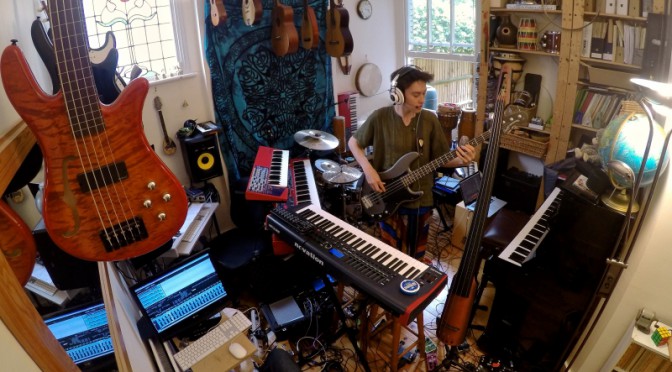If, as I hope, you’ve already read some of my posts here, it should be apparent that music means a great deal to me. Obviously, this is true to many others as well and like many others I also sometimes stop to wonder what is it about music – this abstract thing we cannot see, taste or smell – that makes it so important for so many people?
I’m going to approach the topic here first by setting against each other some views about why music matters or doesn’t. After a short discussion of music’s evolutionary and cultural importance I’ll propose that music has an ethical dimension as well and go on to discuss how music can carry ideas, which again enables its use for even ideological purposes. I’ll wrap up with a vision of music – and culture in general – as a positive force in the contemporary world torn by other disruptive and destructive forces.
The title for this post is borrowed from a blog by professor Henkjan Honing from University of Amsterdam. In his blog professor Honing discusses our topic as it pertains to his research interests in the field of cognitive musicology. His angle is therefore a mix of cognitive sciences, psychology, biology and – to some extent – anthropology, with some philosophical considerations as well.
During my studies I had the privilege and pleasure of following a couple of courses of professor Honing and one of the topics we discussed at length was music’s role in human evolution. You can read further about this discussion in professor Honing’s blog, but in a nutshell the argument is between positions of music being an “auditory cheesecake” – irrelevant to human cognitive evolution (Steven Pinker) – and one that views it as a proto-language (Steven Mithen).
The problem – or one of them – professor Honing points at is the lack of a comprehensive definition of music. It’s difficult to say why music matters to us if we can’t quite put our finger on what exactly is this “music” we care so much of. Is it the notes on the paper? Then what about the music that isn’t, nor has never been, written down? Is it the CDs and mp3s in our collections? Then what about the music that has never been recorded? Is the music to be found in the grooves of the CD or the bits and bytes of its digital form? Or is it the sounds we hear? How do we distinguish musical from non-musical sounds?
|
Henkjan Honing
|
I will leave most of the above questions for later and provide a definition of music to fit the present purposes. Music, as discussed here, is something Christopher Small has called “musicking”. This term emphasises active engagement with music, whether e.g. through making, listening to or dancing to it. Such a broad definition can, in my view, help us understand why – and in which ways – we may find music to be important, or at least relevant, to our lives.
You’re likely reading this post – and hopefully some others on my blog as well 😉 – because music matters to you. But there are people out there who are rather indifferent about music. Such people may not have any preference for a specific genre of music and they are not the least bothered by the “sonic tapestries” in malls and other public spaces. Around four percent of people even have a neurological condition called amusia; they are not able to recognise sounds as music – let alone sing or dance along.
There’s no folk without music
It’s a sort of ethnomusicological cliché that there’s no folk on earth that doesn’t have their own music. And in all likelihood, this has always been so.
Music is used in various ways by people, implying music to be a form of e.g. art and/or entertainment. It’s also part of many – if not most – social rituals; be it ones with a religious nature such as weddings and funerals or profane ones such as sports events.
In some ancient mythologies music has a very concrete existential and/or ontological agency. In Hindu philosophy universe constitutes of sound. Hindu music is organised around the central pitch ōm around which other musical organisations – tālas (rhythmically) and rāgas (melodically) – are performed. In the Finnish Kalevala song has the power to heal – or cause – illnesses and build e.g. ships.
Musical creation of aesthetic spaces
Some more mundane ways of using music include e.g. the above-mentioned “sonic tapestry” usage; as a background for various sorts of activities not directly related to the particular music being played. This has become quite abundant lately with various technologies, such as smartphones and portable media players and online music streaming, affording to listen to music practically anywhere and any time.
This is a very interesting phenomenon in itself warranting a separate discussion, but I’ll take up a few points about it here. The increased popularity of listening to music with headphones has socio-cultural as well as commercial repercussions.
In terms of “musicking” as discussed above, this practice of listening to music by ourselves, even in the company of others, is antithetical to the purpose of music in a traditional sense in which it has worked as a “social glue” bringing people together and enabling various kinds of social rituals. Nowadays it’s increasingly popular to create your own “aesthetic space” by plugging in your headphones and turning on your favourite music whether in public transport, gym, office, or on the street.
Music in 21st-century commercial spaces
In a commercial sense, there’s probably more demand for music today than there has ever been. However, it’s another question who reaps the benefits of this. The traditional business model of the music industry has been challenged already for a couple of decades. This model based on the idea of selling copyrights of musical works dates back to the beginnings of commercial book printing in 18th century England. In the 21st century economy of digital products and streaming services, the old model requires serious rethinking. See here for a short history of this rethinking process.
|
Clubber
|
While the record companies might still be able to make profits through licensing agreements with the streaming service providers, the new “digital paradigm” is challenging for musicians trying to make a living. However, new generations of musicians – such Jacob Collier, I’ve discussed before – are finding ever new ways of making music and reaching their audiences that are also economically viable.
I’ll stop here for now and continue soon about music’s significance through its ethical dimension and the some of the meanings and associations which make it matter.













